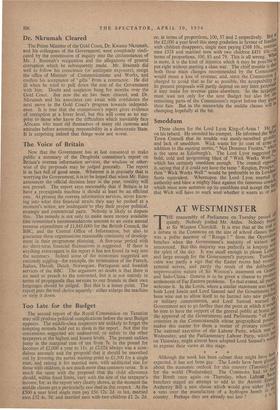Now that the Government has at last consented to make
public a 'summary of the Drogheda committee's report on Britain's oversea information services, the wisdom or other- wise of the proposals may be judged generally. The report is in fact full of good sense. Whatever it is precisely that is worrying the Government, it is to be hoped that when Mr. Eden announces the official decision later in the year. timidity will not prevail. The report says reasonably that if Britain is to have a propaganda machine it should at least be an efficient one. At present the oversea information services, never know- ing into what dire financial straits they may be pushed at a moment's notice, are inadequate to play their proper political, strategic and commercial parts. Nobody is likely to dispute this. The remedy is not only to make more money available (the committee's recommendations amount to an extra annual revenue expenditure of £1,845,000) for the British Council, the BBC, and the Central Office of Information, but also to guarantee these organisations reasonable continuity of develop- ment in their programme planning. A five-year period with no short-term financial fluctuations is suggested. If there is anything extravagant in the report it has not found its way into the summary. Indeed some of the economies suggested are curiously niggling—for example, the termination of the French, Italian, Danish, Dutch, Norwegian, Portuguese and Swedish services of the BBC. The argument no doubt is that there is no need to 'preach to the converted, but it is not entirely in terms of propaganda that services to our friends in their own languages should be judged. But this is a lesser point. The report puts the real choice squarely : either enlarge the machine or strip it down.


































 Previous page
Previous page